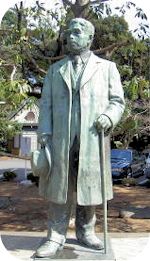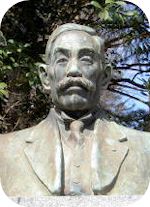|
On the way back, they stopped in at the Paper Museum next door, by the
request of Tsubune whose highschool friend was a director. This museum
is managed by Ohji Paper Company which was founded by Old Shibusawa.
During making a study tour there guided by the director, the rough weather
was almost over.
They arrived at Ohji station and went up the stairs, when the train came.
"What do you think of having an evaluation talk here drinking beer?"
Suga halts Tsubune at Tokyo Station. It is a little over 6:00 pm.
They go to the Marunouchi side. The rotary still remains wet, but they
see patches of blue sky after the typhoon passed.
They enter a beer hall in the station building.
They toast to the productive day, while its afterglow is already lingering
in Suga's mind.
"I didn't know the president Sano had such intimate friendship with
Old Shibusawa. Sano was surely his favorite."
Saying so, Suga takes out the appropriate copied document from the bag.
He says, opening the page,
"This is one of the episodes Shibusawa, built the modern Japan, was
involved in. I am glad to find the precious document."
Suga says seriously.
"A complicated event occurred in Showa 6 (1931). It was the problem
of Sano's resignation."
Several years after this problem, Sano eventually stepped down from the
president by the school confusion of so-called "Blank- Ballot Incident.
But this problem was another happening.
"I will talk about the Blank-Ballot Incident some time later since
it was the point parting from Sano's long government."
Suga elderly says so for now.
The junior speaks in his vague memory.
"Back to this problem of Mr. Sano's resignation, it happened in the
same year of the College's memorial ceremony of the campus move to Kunitachi,
right?"
Senior Suga answers.
"Yes, you are right. It was just after the ceremony. In the year 1931
big events occurred one after another. First of all, the completion ceremony
of Kunitachi campus that you mention. It was in May. The library and the
main school building had been built in the previous year, and the completion
of Kanematsu Auditorium was four years before. Then early this year all
the remaining school buildings were completed. So finally in May, the new
Kunitachi campus was unveiled."
Suga's talk continues.
"In October this year the Rojo (Hold-the-Castle) Incident occurred.
It was another big incident. I entered the college after five years in
Showa 11 (1936). Even then the lingering sound remained. I told you its
outline before, didn't I ?"
Tsubune nods in a dull way.
"Hold the castle...? Isn't it exaggerated?"
"Yes, it is. In other words, it is called the barricade incident."
Accepting Eriko's question, Suga talks as follows, quenching his thirst
with a glass of beer.
Japan at that time was in the middle of the Great Depression, so the Government
used the policy of fiscal restraint as an excuse to try crushing the commercial
colleges, especially Tokyo Commercial College (TCC), saying no necessity
to have an education of commerce and ecomomics. It was the second Shinyu
Case. (The original Shinyu Case was in 1908-1909.)
This time the Government intention to TCC was that the regular cource would be continued while the preparatory and special coueses had to be abolished.
To resist it the whole 2,000 students of TCC barricaded themselve in the
old school building at Tokyo-Kanda.
It lasted for four days and nights, which became known as a hold-the-castle
incident all over Japan. |
|
"Is it what it was?"
Eriko sighs with a twinkle in her eyes because she never heard of that
before.
Encouraged by her, Suga continues the talk positively.
"The professors and graduates banded together with the students, and
the public opinion also took their side. The government against them stuck
to a heavy-handed stance. The situation got so much complicated that the
injured and the arrested came out one after another."
"Wait a minute, sir. You may be a little in a hurry. It's not your
usual way."
Tsubune stops Suga, thinking his talk is beyond Eriko's understanding.
Suga, touching his bald head, answers Tsubune.
"I would like to talk about this incident in detail some day, but
it is all about today because it happened four months after the new-campus
ceremony, so it has no direct relationship with our current issue."
Saying so, he adds the following.
"I believe the Shinyu Case which occurred about 30 years before is
deeply related to how the auditorium was built. Therefore I would very
much like to talk about it soon. Now I focus myself on the issues related
to Old Shibusawa..."
"I keep remembering the barricade incident," Eriko reminds him
repeatedly.
"In the year Showa 6 (1931),"
Suga is back to the talk about the resignation problem of the president
Zensaku Sano. It happened several days after the memorial ceremony of the
campus move to Kunitachi and also four months before the barricade incident.
Sano suddenly proposed his resignation of the president. He refers to the
reason in the chronological list of events of Hitotsubashi Uuniversity
as follows.
 "The article of the communist party incident was reported in the newspapers
on June 20, and unexpectedly it was cleared that my second son was prosecuted. "The article of the communist party incident was reported in the newspapers
on June 20, and unexpectedly it was cleared that my second son was prosecuted.
I am responsible in morality and lost the confidence to educate students as the president. So, I submitted my resignation to the Minister of Education the next day." |
|
Suga expresses not like his usual way.
"I can easily imagine just how much regret he must have felt, because
it was exactly the time the big project of the new campus in Kunitachi
was completed by his leadership following after the destruction of the
whole school buildings in Kanda due to the Great Kanto Earthquake."
The communist party incident and his second son's prosecution in the chronological
list is related to the then Peace Preservation Law.
The law was originally promulgated in order to restrain the confusions
after the Great Kanto Earthquake, but it was revised and reinforced in
an attempt to suppress the thought of communism. It says,
"Who organizes the association for the purpose to change the national
policy, or who is a manager or belonging to a leader is sentenced to death
or unlimited imprisonment or imprisonment for over 5 years... |
|
Suga's talk goes on.
"The professors and most of the students cried to withdraw his resignation.
However, Sano was not able to turn back smoothly himself.
 |
| Mitsuki Hori |
Though I don't like to suspect that Sano's wish was respected, his right-hand
professor Mitsuki Hori visited Old Shibusawa and consulted him. Just because
he was the lifeline of the Sano's side, it does not mean Hori's visit would
have been welcomed by Old Shibusawa. Apparently in spite of the annoying
matter, Shibusawa took the situation earnestly and did not refuse the request."
Tsubune interrupts Suga's talk.
"For Old Shibusawa, didn't he fear for a crisis where the commercial college was at stake, which was realized by the support of his own best?"
Suga answers.
"It is also well said. Anyway this article gives us a feeling of Eiichi
Shibusawa's personality, doesn't it? It was when he was 91 years old, half
a year before his death."
"Could you read it?", Eriko requests.
"This is professor Hori's writing in the memorial edition for Old
Shibusawa in December 1931."
Tsubune thoughtfully reads it on behalf of Suga.
When the case of the president's resignation occurred, all the professors
and students recommended his continuance in office. Nevertheless, president
Sano side did not have any choice but to trouble Old Shibusawa...
Since the resignation of the president was related to his son's moving
to the left, it was unclear whether Old Shibusawa would have wanted to
be involved in this case or not, because Shibusawa was always faithful
to Confucianism. ...
After he listened to me in all the detail, he said.
"Mr. Sano is my friend with the same wish of the commercial education.
Though it seems to be reasonable for him to offer his resignation due to
his son's case, it is, so to speak, his personal feelings for a parent
and a son. We got together with the same thought and fulfilled the long-cherished
desire for our school to promote to the commercial college. He has been
the president of the college and has responsibility to do a lot of things
from now on. In spite of it, he wants to leave the job on account of his
personal feelings. That is the worst of mixing public and private affairs.
...
I would like to try to advise him to remain in his job by telling him my
thought.
I never do this because of your request. I will just do it of my own free
will as one of Sano's friends. ..." |
|
Tsubune reads the ending of this happening as follows.
President Sano, who had been advised to stay in the job by Viscount Shibusawa
and Education Minister Tanaka, decided to stay in it because it was too
difficult to retire considering everything. He visited both of them today
and told them he decided to change his mind.
In conclusion Education Minister Tanaka rejected the letter of resignation
under the approval of Prime Minister Wakatsuki. |
|
"This story is when Old Shibusawa was just before his death, isn't
it? Would they have had to trouble him so much in such a situation?"
Tsubune talks unconciously not knowing how he should feel about it. Suga
does not give him direct answer and says.
"Eiichi Shibusawa was such a person for everything. Therefore both
the Government and the bureaucracy could not do any unreasonable thing
in the fields with him. Old Shibusawa supported anything as much as possible
once he admitted it good."
At a good place to quit, elderly Suga drank up beer slowly and kept silence
for a while.
Outside the window the rotary is brightly lit in the night, and passengers
at Tokyo station are coming and going with each now-no-use umbrella.
Several guests begin to enter the restaurant.
The talk among the three moves to the life of Eiichi Shibusawa.
|